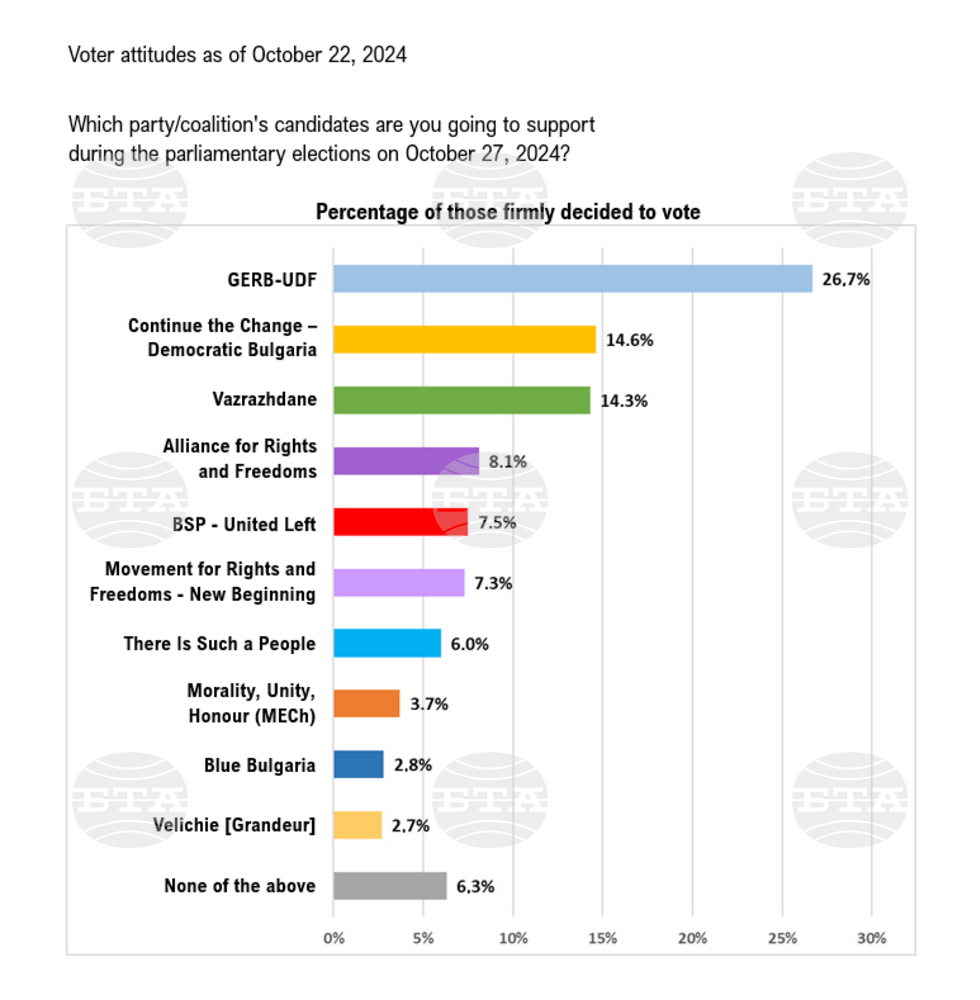site.btaYet Another Election Campaign Fails to Mobilize Voters - Survey


Yet another election campaign has failed to mobilize voters, a survey by Exacta Research Group shows. Just about 30% of respondents have indicated they plan to vote in the October 27 snap parliamentary elections. The research agency notes that actual voter turnout on election day may differ from these findings. Based on the current data and official electoral registers, some 2 million voters are expected to go to the polls.
The nationwide survey was conducted among 1,050 adult Bulgarians between October 19 and 22, 2024.
It found that voters over the age of 50 are more likely to say they intend to vote, while no more than a third of people under 40 are certain they will go to the polls. Voters who have degrees, residents of regional centers, and those living in villages expressed a stronger intention to vote. Members of ethnic communities in this country also reported that they are more likely to vote.
Research from the past year indicates that an increasing number of Bulgarians say they are disgusted with politics and politicians in the country rather than simply apathetic.
Voter attitudes as of October 22
Asked which party or coalition they will vote for in the upcoming parliamentary elections on October 27, 26.7% of decided voters would choose GERB-UDF, 14.6% Continue the Change - Democratic Bulgaria" (CC-DB), 14.3% Vazrazhdane, 8.1% the Alliance for Rights and Freedoms, 7.5% BSP - United Left, 7.3% the Movement for Rights and Freedoms - New Beginning, 6% There is Such a People (TISP), 3.7% Morality, Unity, Honour (MECh), 2.8% Blue Bulgaria, 2.7% Velichie.
The Exacta Research Group data suggests that seven parties are expected to make it into the next parliament. Three smaller parties – MECh, Blue Bulgaria, and Velichie – are also competing but remain below the 4% threshold required to enter the 51st National Assembly.
According to the survey, GERB will undoubtedly win the upcoming elections, leading across all social groups and strata.
With the race for the second place between CC-DB and Vazrazhdane closely contested, the survey reveals that Vazrazhdane has stronger backing among men and the oldest voters, while CC-DB is more popular among younger and educated Bulgarians and those in larger settlements.
The data indicates that 91% of Vazrazhdane’s supporters from the June parliamentary elections plan to vote for the party again. GERB-UDF can rely on 90% of its previous voters. The BSP have retained 81% of its base, CC-DB 78%, TISP 71%.
The protest vote is now largely represented by non-voting Bulgarians, whose numbers are growing. Meanwhile, fewer voters are choosing the "I do not support anyone" option, according to experts.
Governance after the elections
A total of 71% of the Bulgarians who participated in this survey do not believe that Bulgaria can have a stable government after the upcoming elections. Just 29% of respondents are optimistic. Voters of GERB-UDF and CC-DB are more likely to assume that good governance is possible. Supporters of Vazrazhdane, MECh, and Velichie tend to be highly sceptical about this possibility, the experts say.
A total of 42% of respondents who are firmly decided to vote in the October 27 elections deem this a feasible option.
/NZ/
news.modal.header
news.modal.text